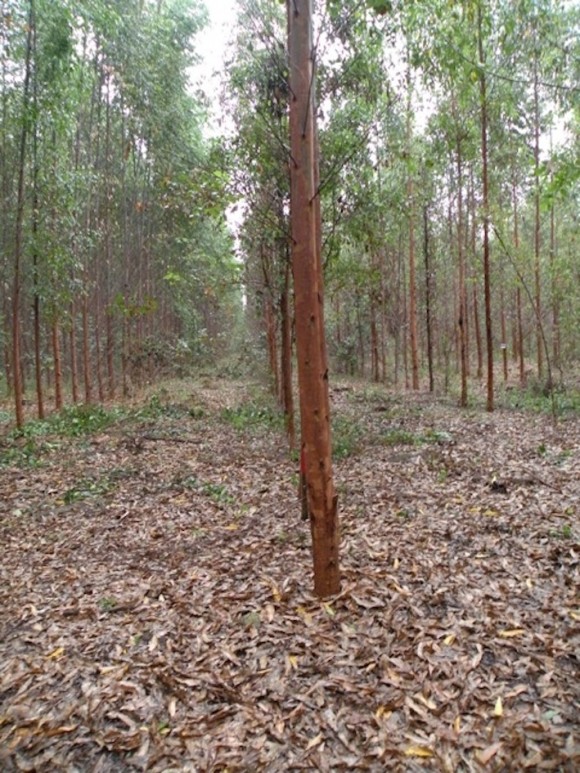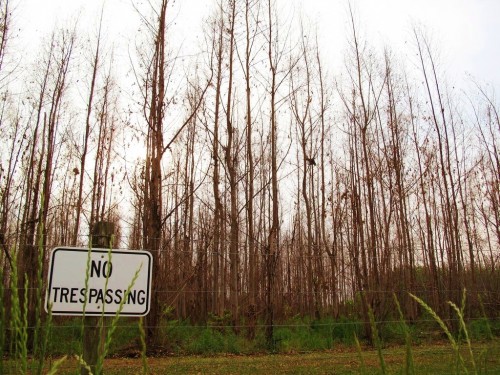ArborGen plans to sell genetically engineered eucalyptus trees for vast plantations from Texas to South Carolina, which would threaten biodiversity, increase wildfires, monopolize groundwater, and worsen climate change. The only way to stop GE trees from invading and contaminating native forests is to ban their commercial release before it is too late. Sign the petition to stop it: http://ow.ly/DYS6G


USDA begins deregulation for first genetically engineered forest tree
By Will Bennington, Global Justice Ecology Project
The USDA is accepting public comments [comment period now closed] on a request by GE tree company ArborGen* to commercially sell hundreds of millions of freeze tolerant genetically engineered eucalyptus trees annually for vast plantations across Texas, Florida, Georgia, Alabama, Louisiana, Mississippi and South Carolina.
Government approval of GE eucalyptus trees would set a dangerous precedent that could lead to the legalization of GE versions of native forest trees, including poplar and pine, which would inevitably and irreversibly contaminate native forests with destructive GE traits, devastating forest ecosystems and wildlife. Once GE trees escape, there is no way to call them back.
On February 22, the US Department of Agriculture Animal Plant Health Inspection Service (APHIS) announced a Notice of Intent to prepare an Environmental Impact Statement (EIS) regarding a petition to deregulate [legalize] the commercial sale of ArborGen’s GE eucalyptus. If ArborGen’s request is approved, GE eucalyptus will be the first commercially available genetically engineered forest tree in the US.
This EIS represents the first time APHIS has ever prepared a full EIS for a GE or GMO organism without being forced to by litigation. The fact that APHIS is voluntarily preparing this EIS indicates that the agency is aware of both the potentially severe environmental impacts these GE trees will have and the overwhelming public opposition to them.
“The dramatic and dangerous impacts of non-GM industrial eucalyptus plantations are well known and include invasiveness, desertification of soils, depletion of water, increased threat of wildfire and loss of biodiversity,” says Anne Petermann, director of the Global Justice Ecology Project in the US. “In Brazil, these plantations are called ‘green deserts’ because nothing can grow in them. Now they want to genetically engineer them, which will make them even more destructive.” From the Guardian UK
Eucalyptus trees are not native to the US and are a documented invasive species (check out this fact sheet on GE eucalyptus). They are also highly flammable and known to deplete ground water. The freeze tolerant GE eucalyptus trees will be able to survive in regions too cold for their non-GE relatives.
The only way to stop GE trees from invading and contaminating native forests is to ban their commercial release before it is too late.
Sign the STOP GE Trees Campaign petition to the USDA demanding a ban on GE trees!
httpvh://youtu.be/b-0luL6nCws
Global Justice Ecology Project: Across the globe, timber plantations are wreaking havoc on forests and forest dependent communities. Now, to further exacerbate this damage, genetically engineered trees (or GE trees) pose a new and unprecedented threat.
JOIN THE CAMPAIGN AGAINST GE TREES AND EUCALYPTUS PLANTATIONS!


From May 26-June 1, industry leaders, scientists and policy makers will meet in Asheville, NC for the Tree Biotechnology 2013 Conference. The conference will discuss current and future applications of GE trees, such as large-scale plantations of GE eucalyptus trees in the southern United States, from South Carolina to Texas.
The STOP GE Trees Campaign is mobilizing events and protests in Asheville, calling for a ban on the release of GE trees into the environment. To be alerted to updates on this situation and get involved in these events or the campaign to stop GE eucalyptus trees, email will@globaljusticeecology.org or go to nogetrees.org
Background: Non-GE eucalyptus plantations already have devastating impacts all over the world. Based on these documented impacts, GE eucalyptus plantations in the US will likely cause:
- Clear-cutting of biodiverse forests for conversion to industrial GE eucalyptus plantations–called “green deserts” due to their devastating impacts on biodiversity;
- Invasive spread of GE eucalyptus trees into native ecosystems–eucalyptus is already a documented invasive species in Florida and California;
- Increased danger of firestorms—Eucalyptus contains a highly volatile oil and are explosively flammable;
- Displacement of wildlife that cannot use the non-native eucalyptus trees for habitat or food;
- Contamination of soils and groundwater with toxic agrochemicals used on the plantations;
- Worsening of Drought—Eucalyptus trees have deep taproots, monopolize ground water and dry up soils;
- Worsening of climate change through the destruction of carbon rich native forests for carbon poor plantations.
Global Justice Ecology Project and the STOP GE Trees Campaign are mobilizing to fight this threat. View our 5 minute video on the impacts of timber plantations and GE trees.
*To read the 580 page petition from ArborGen requesting deregulation of freeze-tolerant GE eucalyptus trees, click here
Global Justice Ecology Project promotes taking action to address the common root causes of social injustice, economic domination, and environmental destruction.









Pingback: Sustainable Cellulosic Ethanol: Cost, Political Challenges | WilderUtopia.com